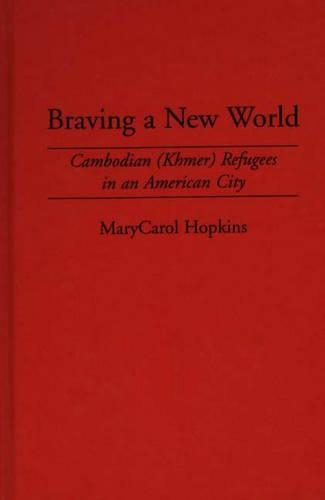
Braving a New World: Cambodian (Khmer) Refugees in an American City
(Hardback)
Publishing Details
Braving a New World: Cambodian (Khmer) Refugees in an American City
By (Author) Marycarol Hopkins
Bloomsbury Publishing PLC
Praeger Publishers Inc
21st October 1996
United States
Classifications
Tertiary Education
Non Fiction
Anthropology
Urban communities / city life
Refugees and political asylum
305.89593073
Physical Properties
Hardback
192
Description
This ethnography, based on a five-year field study, presents a holistic view of a nearly invisible ethnic minority in the urban Midwest, Cambodian refugees. Hopkins begins with a brief look at Cambodian history and the reign which led these farmers to flee their homeland, and then presents an intimate portrait of ordinary family life and also of Buddhist ceremonial life. The book details their struggles to adjust in the face of the many barriers presented by American urban life, such as poverty, dangerous neighborhoods, and unemployment, and also by the conflict between their particular needs and American institutions such as schools, health care, law, and even the agencies intended to help them.
Reviews
"Cambodian Americans are not ordinary immigrants. First caught up in Vietnam's war in Southeast Asia, then ravaged by the maniacal policies of Pol Pot and his young minions, who tried and nearly succeeded in eliminating the middle class from Cambodian society, those who finally made it to the US bear unique scars and have many special problems and needs. Although focused primarily on the experiences of Cambodian refugees in one American city, this book offers sharp insights into their plight, their difficulties in adapting to new environs, and, as the subtitle of the final chapter states, the struggles they have 'maintaining traditions [and] transcending barriers.'...Hopkins achieves her double goal of providing a descriptive ethnography of Cambodian refugees in 'Middle City' and a foundation for a long-term study of social change."-Choice
Cambodian Americans are not ordinary immigrants. First caught up in Vietnam's war in Southeast Asia, then ravaged by the maniacal policies of Pol Pot and his young minions, who tried and nearly succeeded in eliminating the middle class from Cambodian society, those who finally made it to the US bear unique scars and have many special problems and needs. Although focused primarily on the experiences of Cambodian refugees in one American city, this book offers sharp insights into their plight, their difficulties in adapting to new environs, and, as the subtitle of the final chapter states, the struggles they have 'maintaining traditions [and] transcending barriers.'...Hopkins achieves her double goal of providing a descriptive ethnography of Cambodian refugees in 'Middle City' and a foundation for a long-term study of social change.-Choice
The value of the book is two-fold; first, for those who have no expereince with Khmer communities, the book describes the daily lives of Khmer in one U.S. city....The book's second point of importance lies in the Chapter 6 discussion of American institutions and individuals as "agents of culture change."-Crossroads
"The value of the book is two-fold; first, for those who have no expereince with Khmer communities, the book describes the daily lives of Khmer in one U.S. city....The book's second point of importance lies in the Chapter 6 discussion of American institutions and individuals as "agents of culture change.""-Crossroads
Author Bio
MARYCAROL HOPKINS is Associate Professor of Anthropology at Northern Kentucky University.
